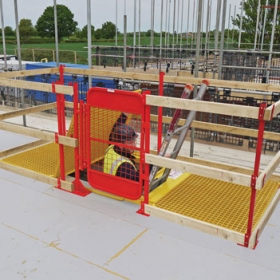Offsite: a healthier way of delivering homes
England is short of four million homes. There are at least 320,000 homeless people throughout Britain and over a million on housing waiting lists. Needless to say, the housebuilding industry needs to change. The only way this can happen is if we look in on ourselves and our own behaviour and acknowledge our shortcomings; something that is hard to do. MMC Editor Joe Bradbury investigates.
The bad news is that the UK construction industry is currently responsible for 45% of total UK carbon emissions, 32% of all landfill waste and is responsible for more water pollution incidents than any other industry. The good news is that we have the knowledge, skills and technology to facilitate real change in the world, when we put our minds to it. Implementing offsite construction into the housebuilding sector could be the catalyst.
Waste not, want not
One of the key factors that will either seal our reputation as innovators or sully it indefinitely is the materials we use and how we choose to use them. With an unprecedented shortage of housing in this country, it is clear to see that despite what construction industry doomsayers print, the UK has a voracious appetite for housing that isn’t going away any time soon.
The construction industry is the largest consumer of natural resources in the UK today; a stark point that highlights just how high up on the agenda reconsideration of our building practices should be. The impact of our materials usage on the environment in of itself is staggering; a recent report by Willmott Dixon Group suggested that the construction industry alone is accountable for around 45-50% of global energy usage, nearly 50% of worldwide water usage, and around 60% of the total usage of raw materials.
The benefits of adopting more considerate ways to use materials are far-reaching. Take FSC-approved timber as just one of many examples; manufacturers who use forest products that are FSC approved can do so with confidence, safe in the knowledge that they are helping to ensure our forests are alive and well for generations to come. But the benefits are also far more immediate and closer to home than that; wood is a natural, renewable material, used often in modular building. It offsets our carbon footprint and offers significant thermal efficiency, keeping energy bills low. For the four million people in Britain living in fuel poverty today, building more energy efficient homes using modern methods of construction is urgent. Interestingly, if housing targets were met through timber-frame construction alone, new build homes in the UK would serve as carbon ‘banks’, capturing and storing nearly 4 million tonnes of CO2 every year.
Better for the environment
According to ‘The Waste and Resources Action Programme’, offsite construction can generate up to 90% less waste than traditional onsite building methods. This is largely because a factory is a much more controlled environment than a traditional building site – with far fewer variables
Modular construction offers a greater degree of reusability; buildings can often be disassembled and moved to another site entirely if necessary. They can be shifted and repurposed when required. However, should a modular building find itself no longer fit for requirement as it stands, many of its components can be salvaged and re-used in another project, reducing the need for fresh new materials in each new build. This reduction in materials usage protects depleting stock of resources whilst simultaneously lowering waste.
Offsite construction is far less energy intensive than traditional housebuilding methods. The carbon footprint left by the many construction vehicles and machinery on the site of a traditional construction project alone is considerably larger than that of modular construction. Put simply, fewer vehicles involved and less time spent on site results in less greenhouse gases being released into our environment.
And due to being built away from the construction site, modern methods of construction such as offsite and modular are a great way to reduce and control noise levels, causing less disruption to the environment and the people around it.
To summarise
The positive effects of modular construction on the housebuilding industry cannot be overstated, and with the UK Environment Agency and other government bodies putting increasing pressure on construction companies to reduce pollution and conform to environmental regulations, it is clear to see that change is imminent – embrace the future, build homes offsite.




Leave a Reply
Want to join the discussion?Feel free to contribute!